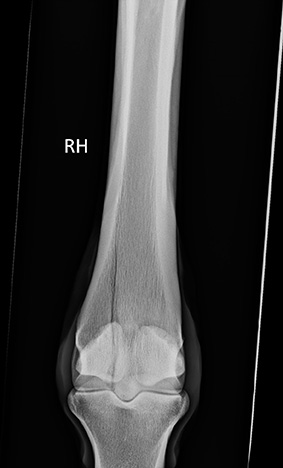New Thoroughbred genetic fracture risk scoring system developed by the RVC discovers collagen is contributing factor
New research from the Royal Veterinary College (RVC) into genetic risks of fracture in Thoroughbred horses has found that horses with lower levels of collagen type III have a higher risk of fracture.

Previously, there has been limited research into this disease with no specific genetic mechanisms identified. However, these new findings have enabled the RVC to develop systems to identify genetically high-risk horses. This will provide a greater understanding of how best to identify, diagnose and manage horses at high risk of fractures and contribute to greater health and welfare of Thoroughbreds.
Bone fractures are common in Thoroughbred racehorses, due to the forces the bones can experience, and are sadly a leading cause of euthanasia, with approximately 60 horses each year having to be euthanised on UK racecourses because of this disease. However, fracture is a complex condition, with both environmental and genetic risk factors affecting a horse’s susceptibility.
Conducting the research, the team, led by Dr Debbie Guest, Senior Research Fellow at the RVC, developed a polygenic risk score, which provides a measure of disease risk due to a variety of genes, and used this to determine the distribution of scores across the general UK Thoroughbred population.
The team were then able to utilise this information to select cells from horses whose risk placed them at the extreme ends of the population with either very low or very high risk. These cells were then used in laboratory studies to establish a cell model and investigate the genetic factors involved in fracture risk.
The research found that collagen type III, a gene which is required for normal bone formation, is expressed at lower levels in bone cells from horses with a high genetic risk of fracture. This is because they have a change in their DNA sequence in the region which controls how much collagen III is produced.
Additional research is now being conducted to validate the risk-scoring system in another cohort of horses. Further studies using this system and cell model will help to identify other genes and processes to better understand why some horses are inherently more susceptible to fracture than others.
Dr Debbie Guest, Senior Research Fellow at the RVC, said:
“Bone fractures are a major welfare concern in Thoroughbred racing. We know that there are many environmental risk factors for fracture and much has been done over the years to reduce these risks. Despite this effort, fractures sadly still occur, and we know that some horses are genetically more predisposed to fracture than others.
“The development of a polygenic risk score for fracture will allow us to identify horses that are at high genetic risk to allow the targeted use of diagnostic imaging and close monitoring of their bone health. This study has also demonstrated the power of using cell models to work out what differences exist in bone cells from high and low-risk horses and therefore why some horses are at high risk. This is vital to develop new interventions for high-risk horses in the future so that they are less likely to suffer from a catastrophic fracture”.
The research was funded by the Horserace Betting Levy Board, the Anne Duchess of Westminster Charitable Trust and The Alborada Trust.
Notes to Editors
Reference
Palomino Lago, E.; Baird, A.; Blott, S.C.; McPhail, R.E.; Ross, A.C.; Durward-Akhurst, S.A.; Guest, D.J. A Functional Single-Nucleotide Polymorphism Upstream of the Collagen Type III Gene Is Associated with Catastrophic Fracture Risk in Thoroughbred Horses. Animals 2024, 14, 116. https://doi.org/10.3390/ani14010116
The article is available to read here: https://www.mdpi.com/2076-2615/14/1/116
For more information please contact
- Jasmin De Vivo at jasmin.devivo@plmr.co.uk or rvc@plmr.co.uk
- Press Line: 0800 368 9520
About the RVC
- The Royal Veterinary College (RVC) is the UK's largest and longest established independent veterinary school and is a Member Institution of the University of London.
- It is one of the few veterinary schools in the world that hold accreditations from the RCVS in the UK (with reciprocal recognition from the AVBC for Australasia, the VCI for Ireland and the SAVC for South Africa), the EAEVE in the EU, and the AVMA in the USA and Canada.
- The RVC is ranked as the top veterinary school in the world in the QS World University Rankings by subject, 2023.
- The RVC offers undergraduate and postgraduate programmes in veterinary medicine, veterinary nursing and biological sciences.
- The RVC is a research-led institution, with 88% of its research rated as internationally excellent or world class in the Research Excellence Framework 2021.
- The RVC provides animal owners and the veterinary profession with access to expert veterinary care and advice through its teaching hospitals and first opinion practices in London and Hertfordshire.
You may also be interested in:
-
New collaboration between the RVC and UCB seeks to better understand diseases of excessive bone formation
Research, led by the RVC, will explore disease causing mechanisms of two severe bone diseases …

